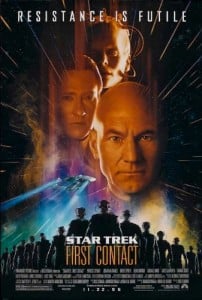
Star Trek: First Contact, directed by Jonathan Frakes. Written By Rick Berman, Brannon Braga, And Ronald D. Moore. Starring Patrick Stewart, Jonathan Frakes, Brent Spiner, Levar Burton, Michael Dorn, Gates Mcfadden, Marina Sirtis, Alfre Woodard, James Cromwell, And Alice Krige. Distributed by Paramount Pictures, 1996. Rated PG-13 for some sci-fi adventure violence. Running Time: 111 minutes.
Reviewed by Ari Armstrong
Imagine a future in which humans rove the galaxy in starships; colonize the moon, distant planets, and space stations; and radically expand their knowledge of the universe. Star Trek: First Contact invites us to imagine just such a future, and it does so in the context of a nail-biting action story pitting the “next generation” crew of the Federation ship Enterprise against mankind’s most frightening foes of their fictional universe: the collectivist Borg, who rasp, through cybernetic implants, “Resistance is futile.”
Although each of the four films involving The Next Generation (the crew led by Captain Jean Luc Picard) has its merits, First Contact rises above the rest in its storytelling. In the film, the Borg first attack Earth and then send a probe back to their past (our future) to hinder mankind’s development and make Earth easy prey for the Borg.
What is the singular event the Borg hopes to stop? It is the first human space flight involving “warp” (faster than light) travel, something that (in the world of Star Trek) takes place on April 4, 2063. That the pivotal event of the film is a major technological advancement says a lot about the spirit of the franchise.
The crew of Enterprise follow the Borg probe back in time, leading to a twofold story: In Montana, part of the crew help an inventor of 2063 repair his warp ship damaged by the Borg, while on Enterprise (orbiting Earth) the rest of the crew battle a Borg takeover.
The performances are stellar. Patrick Stewart, who portrays Picard and who once performed with the Royal Shakespeare Company, is widely regarded as the finest actor of the Star Trek universe. In this film, he leads the ship’s crew against the Borg. Brent Spiner wonderfully portrays Enterprise’s android science officer, Data, who is captured by the Borg and who must decide where his values and allegiances lie. Alice Krige successfully portrays the Borg’s leader as alternately sultry and horrifying—a challenging feat for an actor. Alfre Woodard portrays a woman from 2063 who befriends Picard, and James Cromwell portrays the inventor of the first warp ship: Both actors create intriguing characters.
The film features not only frightening and suspenseful scenes with the Borg, but dramatic and humorous scenes with the heroes. In one emotional scene, Woodard’s character, Lily, invokes the story of Moby Dick to try to persuade Picard to change his course of action. As for the humor, when Picard informs Lily that she almost killed him with a phaser gun set on maximum power, she replies meekly, “It’s my first ray gun.” With scenes such as these, the film pulls the audience alternately into tense fear, cathartic laughter, profound wonder, and celebratory rejoicing.
My sole criticism of the film is that it denigrates financial profit and lauds a future without money. The inventor of 2063 says all he wanted from his scientific work was money and an island filled with naked women; here the film equates financial profits with hedonism. And Picard says, “Money doesn’t exist in the 24th century. . . . The acquisition of wealth is no longer the driving force of our lives. We work to better ourselves and the rest of humanity.” Here Picard echoes Karl Marx’s absurd theory that a technological world without money is possible and desirable (it is neither), and he wrongly suggests that earning a living is somehow at odds with bettering one’s self (it is not). Although such ideological problems plague the entire Star Trek franchise, they are, in this film, thankfully, not emphasized so much as to be too distracting.
First Contact is a fun film with an exciting story. But it is much more than that: Fundamentally, it is an ode to the spirit of scientific discovery. And that is why this film will live on as a work of science fiction and why it will continue to inspire those who watch it to strive for a future of reason, prosperity, and technological achievement.


![[TEST] The Objective Standard](https://test.theobjectivestandard.com/wp-content/uploads/2017/10/logo.png)













